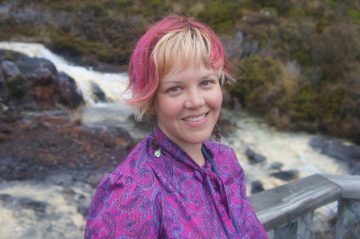By Miranda Massie (original posting)
This Month’s Thriving Faculty member is Emily Rugel, a PhD candidate and research fellow in the School of Population and Public Health.
Thriving Faculty is a monthly column that highlights UBC faculty who exemplify the integration of health and wellbeing into their classrooms, research, departments and communities.
What strategies do you use in your own life that help you thrive as Faculty?
As someone whose research keeps me tied to a desk for most of the day, I’ve found that taking advantage of each and every opportunity to get moving is critical. I use a fitness tracker to get a better idea of how many steps I’ve taken throughout the day, and I’ve found that it really helps motivate me. I’ve also had to think creatively about when and how to fit in exercise: I walk around my building when I’m on phone calls, get off the 99 a stop or two early, and explore the farthest corners of campus whenever possible!Are there any specific initiatives and/or research you are involved in that promote physical and mental health and wellbeing?
My research focuses on the role of nature in supporting mental health, and in particular on how we can ensure that everyone is able to access this important resource in urban environments. Right now, I’m in the midst of developing a Natural Space Index for Metro Vancouver so we can better understand the best way to measure access, as well as identifying existing inequities as a first step in resolving them.
Are there any resources on campus that you have found to be helpful for promoting wellbeing for either yourself or your students?
We live in a stunningly beautiful city, and Point Grey is an especially lovely community that offers easy access to beaches, forests, and gardens. I think many students and faculty and staff members forget that we can visit sites like Nitobe and the Botanical Garden for free, making it easy and affordable to squeeze in a brief visit. These natural areas are a key factor in our wellbeing, especially our ability to handle the stresses of the school year and refocus on our work, so I encourage everyone to take advantage of them.
In your role as faculty, please describe your experience balancing work-life commitments? Is there a metaphor that depicts this relationship?
As Ph.D. students, it can certainly be challenging to juggle the array of UBC commitments – including assistantships in the classroom or the lab, our own thesis efforts, and school work – along with the rest of our lives. It’s really easy to push everything else off your plate to find room for academic tasks, but that comes with a critical cost, not only to the rest of your responsibilities, but also to your sanity! I try to remember that the time I take out to care for myself and enjoy the people I love is essential to recharging my batteries and ensuring that I do the best job possible in my professional life.
Emily Rugel’s research broadly explores the association between health and place. Her specific interests include disparities in access to health-promoting urban resources and the impact of natural spaces on mental health. To advance these efforts, she harnesses the power of geographic information systems (GIS) and interdisciplinary partnerships alongside more traditional tools. Before joining the Bridge Program, Emily worked at the National Institutes of Health in a variety of research and research administration positions. She holds a Master of Public Health from Portland State University and a B.A. in Journalism from New York University, but firmly believes in the acquisition of knowledge through chance encounters as well as classroom instruction.
